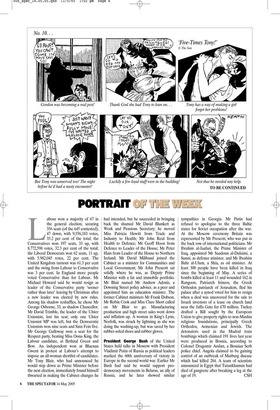PORTRAIT OF THE WEEK L abour won a majority of 67
in the general election, securing 356 seats (of the 645 contested), 47 down, with 9,556,183 votes, 35.2 per cent of the total; the Conservatives won 197 seats, 33 up, with 8,772,598 votes, 32.3 per cent of the total; the Liberal Democrats won 62 seats, 11 up, with 5,982,045 votes, 22 per cent. The United Kingdom turnout was 61.3 per cent and the swing from Labour to Conservative was 3 per cent. In England more people voted Conservative than for Labour. Mr Michael Howard said he would resign as leader of the Conservative party ‘sooner rather than later’ leaving by Christmas after a new leader was elected by new rules. Among his shadow reshuffles, he chose Mr George Osborne, 33, as shadow Chancellor. Mr David Trimble, the leader of the Ulster Unionists, lost his seat; only one Ulster Unionist MP was left, but the Democratic Unionists won nine seats and Sinn Fein five. Mr George Galloway won a seat for the Respect party, beating Miss Oona King, the Labour candidate, at Bethnal Green and Bow. An independent won at Blaenau Gwent in protest at Labour’s attempt to impose an all-woman shortlist of candidates. Mr Tony Blair, who had announced he would step down as Prime Minister before the next election, immediately found himself thwarted in making the Cabinet changes he had intended, but he succeeded in bringing back the shamed Mr David Blunkett as Work and Pensions Secretary; he moved Miss Patricia Hewitt from Trade and Industry to Health; Mr John Reid from Health to Defence; Mr Geoff Hoon from Defence to Leader of the House; Mr Peter Hain from Leader of the House to Northern Ireland; Mr David Miliband joined the Cabinet as a minister for Communities and Local Government; Mr John Prescott sat solidly where he was, as Deputy Prime Minister with a fat and immobile portfolio. Mr Blair named Mr Andrew Adonis, a Downing Street policy adviser, as a peer and appointed him an education minister. The former Cabinet ministers Mr Frank Dobson, Mr Robin Cook and Miss Clare Short called on Mr Blair to go. Manufacturing production and high street sales went down and inflation up. A woman in King’s Lynn, Norfolk, was struck by lightning as she was doing the washing-up, but was saved by her rubber-soled shoes and rubber gloves.
President George Bush of the United States held talks in Moscow with President Vladimir Putin of Russia as political leaders marked the 60th anniversary of victory in Europe in the second world war. Earlier Mr Bush had said he would support prodemocracy movements in Belarus, an ally of Russia, and he later showed similar sympathies in Georgia. Mr Putin had refused to apologise to the three Baltic states for Soviet occupation after the war. At the Moscow ceremony Britain was represented by Mr Prescott, who was put in the back row of international politicians. Mr Ibrahim al-Jaafari, the Prime Minister of Iraq, appointed Mr Saadoun al-Dulaimi, a Sunni, as defence minister, and Mr Ibrahim Bahr al-Ulum, a Shia, as oil minister. At least 300 people have been killed in Iraq since the beginning of May. A series of bombs killed at least 11 and wounded 162 in Rangoon. Patriarch Irineos, the Greek Orthodox patriarch of Jerusalem, fled his palace after a synod voted for him to resign when a deal was uncovered for the sale to Israeli investors of a lease on church land near the Jaffa Gate for £70 million. Turkey drafted a Bill sought by the European Union to give property rights to non-Muslim religious foundations, principally Greek Orthodox, Armenian and Jewish. The detonators used in the Madrid train bombings which claimed 191 lives last year were produced in Bosnia, according to Colonel Dragomir Andan, a Bosnian Serb police chief. Angola claimed to be gaining control of an outbreak of Marburg disease which had killed 284. A team of scientists announced in Egypt that Tutankhamun had died of gangrene after breaking a leg at the age of 19. CSH


































































 Previous page
Previous page